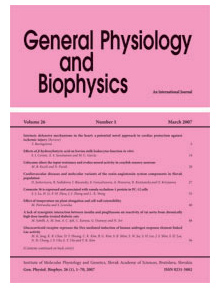Journal info
Aims and Scope |
||
Select Journal
Journals
Bratislava Medical Journal Endocrine Regulations General Physiology and Biophysics 2024 2023 2022 2021 2020 2019 2018 2017 2016 2015 2014 2013 2012 2011 2010 2009 2008 2007 Neoplasma Acta Virologica Studia Psychologica Cardiology Letters Psychológia a patopsych. dieťaťa Kovove Materialy-Metallic Materials Slovenská hudbaWebshop Cart
Your Cart is currently empty.
Info: Your browser does not accept cookies. To put products into your cart and purchase them you need to enable cookies.
General Physiology and Biophysics Vol.34, No.3, p.249–261, 2015 |
||
| Title: Carbosulfan-induced oxidative damage following subchronic exposure and the protective effects of N-acetylcysteine in rats | ||
| Author: Ines El-Bini Dhouib, Alya Annabi, Aicha Jrad, Narges El-Golli, Najoua Gharbi, Mohamed M. Lasram, Saloua El-Faza | ||
| Abstract: Carbosulfan (CB)-induced oxidative stress leads to the inevitable accumulation of free radicals and eventual alteration of antioxidant enzymes in various biological systems. The present study is designed to investigate the preventive effect of N-acetylcysteine (NAC) on carbosulfan-induced hepatic and renal dysfunction in rats. Rats exposed to CB and NAC were examined for toxicity by assessing various biochemical alteration and stress markers including in liver and kidney. Significant increases of blood alanine aminotransferase (ALT), alkaline phosphatase (ALP), gamma glutamyltransferase (GGT), creatinine and urea were detected in CB-treated rats. In addition, the levels of antioxidative enzymes such as catalase (CAT), superoxide dismutase (SOD) and reduced glutathione (GSH) also were assessed. According to the results, rats exposed to carbosulfan showed a significant increase in the accumulation of stress markers and an alteration in the antioxidative enzymes activity, when compared to their respective controls. Interestingly, administration of NAC to CB-treated rats attenuates the toxicity of this compound, objectified by biochemical and oxidative improvement of liver and kidney. Thus, the present study reports for the first time that NAC could be a promising therapeutic agent against CB-induced oxidative stress. |
||
| Keywords: N-acetylcysteine — Carbosulfan — Liver — Kidney — Oxidative stress | ||
| Published online: 22-Jun-2015 | ||
| Year: 2015, Volume: 34, Issue: 3 | Page From: 249, Page To: 261 | |
| doi:10.4149/gpb_2015005 |
||
|
|
 download file download file |
|

